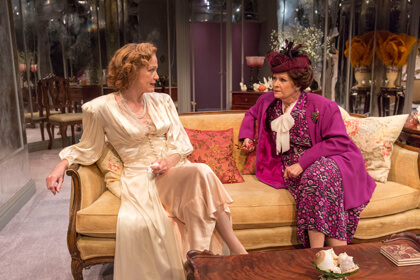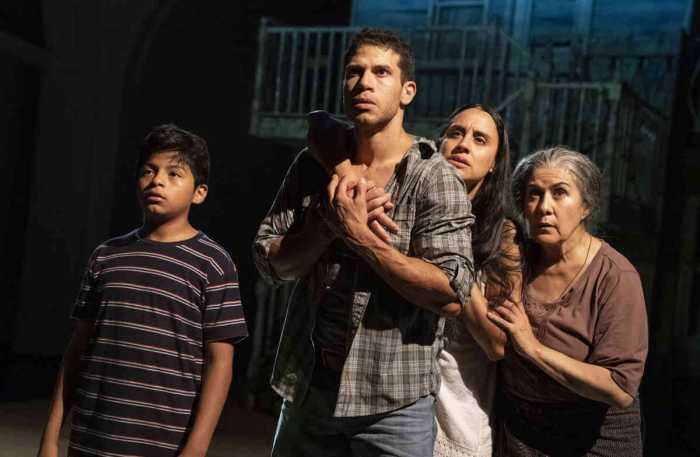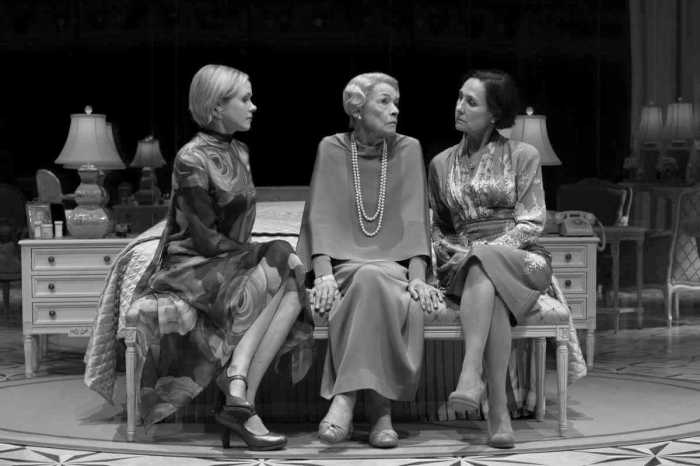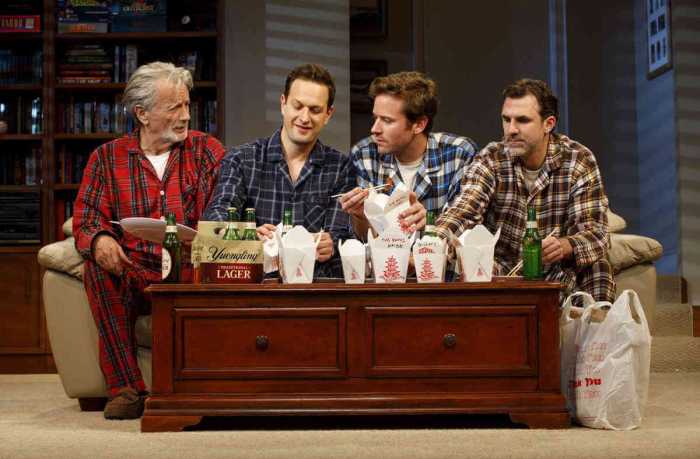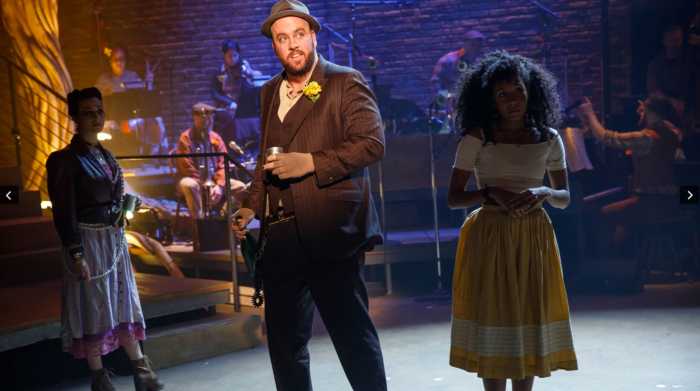Kieran Culkin and Michael Cera in Kenneth Lonergan’s “This Is Our Youth,” directed by Anna D. Shapiro. | BRIGITTE LACOMBE
BY CHRISTOPHER BYRNE | Not much happens on the surface of “This is Our Youth,” Kenneth Lonergan’s 1996 play about three over-privileged and searching young people in 1982, now getting a solid revival on Broadway. What makes the play intriguing is its larger literary context — young people grappling with their place in a culture from which they feel somehow disenfranchised. The successors of Hemmingway’s “lost generation” between the World Wars and John Osborne’s “angry young man” of the 1950s, the three characters thrown together in a down-at-the-heels Upper West Side apartment are caught between their secure childhoods — one of them brings his beloved toys when he leaves home — and adulthood for which they are unprepared.
The three search for an authentic —or what they think is authentic — human experience, a journey at odds with the Reagan-era greed around them. Combine that conflict with keenly observed, if sometimes predictable, characters and you get an interesting study of alienated young adults.
Dennis is living in the cheap apartment because his parents would rather have him live separately than with them. He makes do by dreaming big and dealing drugs. After a fight with his father, Warren, a prep school classmate, shows up at Dennis’ door with his toy collection and $15,000 he’s stolen from his father. The men are later joined by Jessica, a girl Warren is smitten with but who he feels is out of his league. He successfully woos her with the stolen cash, and Warren and Dennis try to build on that stash in a drug deal, but it goes wrong. In the end, Jessica leaves, Warren is bereft, and things go on. The slight plot doesn’t really demand resolution.
Stories of privilege never change — for better or worse
Under the direction of Anna D. Shapiro, the cast does an excellent job of bringing this world to life. Michael Cera as the nerdy Warren is superb. He is a present and focused actor who listens brilliantly and executes the physical comedy of the piece flawlessly. Kieran Culkin is outstanding as Dennis. Even if the character’s bravado masking a deeper insecurity is a tired literary convention, Culkin is a live wire — consistently interesting and fully in command of his character’s nuances. Charming though less successful is Tavi Gevinson as Jessica. Like Culkin’s, her role is based in conventional issues — here, parental conflict, burgeoning sexuality, and a desire for connection — and Gevinson’s overally strident performance lacks the complexity the other two actors bring to their characters.
These three young adults are not sympathetic characters and, yet, they spark compassion. Lonergan effectively achieves a larger emotional truth about the universal struggle to accept adulthood and grow into maturity. That is not a new story in human experience, but it is one each of us lives.
Kristin Griffith and Cynthia Darlow in George Kelly’s “The Fatal Weakness,” directed by Jesse Marchese. | RICHARD TERMINE
Once again, the Mint scores with a pitch-perfect, beautifully staged revival of a nearly forgotten play. George Kelly’s “The Fatal Weakness” tells the story of a proper middle class marriage torn apart by a husband’s infidelity. Illusions are shattered and a betrayed woman regains her sense of self in a way comparatively modern for 1946. “The Fatal Weakness” might have seemed scandalous and even cynical in that day, with Kelly getting in his digs at the chafing of matrimonial ties that bind, the scandal of divorce, and self-actualized women
With outstanding performances by Kristin Griffith, Cynthia Darlow, and Cliff Bemis, spot-on direction by Jesse Marchese, gorgeous costumes by Andrea Varga, and sets by Vicki R. Davis, this production is superb in every respect. It makes clear that when it comes to the human comedy, there’s not much new under the sun — but how delicious that comedy can be.
It’s difficult to imagine anyone under the age of 70 finding much relevance in A.R.Gurney’s “Love Letters.” This twee, epistolatory story charts the sometimes prickly, sometimes passionate relationship between Melissa and Andrew from grade school in the Depression to Melissa’s apparent suicide in the 1970s. The characters are obvious stereotypes of the privileged in the literary traditions of Fitzgerald, John Knowles, and J.D. Salinger, which means they are woefully dated in 2014. The banality of their tribulations quickly wears thin as their shallow and predictable story arcs unfold.
This is low impact theater, and Brian Dennehy and Mia Farrow sit at a table and read the letters. Dennehy is desultory and seldom engages, while Farrow is excessively mannered and generically neurotic. Farrow and Dennehy will be followed over the next months by a string of stars on the brink of having their “sad last days” chronicled by the supermarket tabloids, however hale they might be in actuality. Still, if you want to ogle erstwhile celebrities for 90 minutes with impunity, by all means go. You can pick your poison, but obviously all I wanted was a poison pen.
THIS IS OUR YOUTH | Cort Theatre, 138 W. 48thSt. | Tue., Thu., Sun.-Mon. at 7 p.m.; Fri.-Sat. at 8 p.m.; Sat.-Sun. at 2 p.m. | $85-$135 at telecharge.com or 212-239-6240 | Two hrs., 20 mins., with intermission
THE FATAL WEAKNESS | The Mint Theater | 311 W. 43rd St. | Through Oct. 26: Tue.-Thu. at 7 p.m.; Fri.-Sat. at 8 p.m.; Sun. at 2 p.m. | $55 at minttheater.org or 866-811-4111 | Two hrs., 30 mins., two intermissions
LOVE LETTERS | Brooks Atkinson Theatre,256 West 47th St. | Tue.-Thu. at 7 p.m.; Fri.-Sat. at 8 p.m.; Wed., Sat. at 2 p.m.; Sun. at 3 p.m. | $52-$127 at ticketmaster.com or 800-745-3000 | 90 mins.

